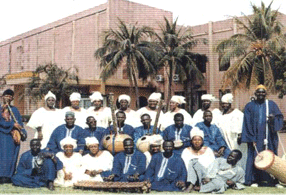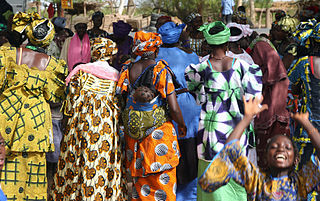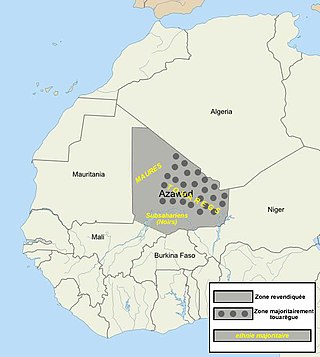Kassoum Denon is a Malian politician. He serves as the Malian Minister of Agriculture. [1]
Kassoum Denon is a Malian politician. He serves as the Malian Minister of Agriculture. [1]

Mali, officially the Republic of Mali, is a landlocked country in West Africa. Mali is the eighth-largest country in Africa, with an area of over 1,241,238 square kilometres (479,245 sq mi). The country is bordered to the north by Algeria, to the east by Niger, to the northwest by Mauritania, to the south by Burkina Faso and Ivory Coast, and to the west by Guinea and Senegal. The population of Mali is 21.9 million, 67% of which was estimated to be under the age of 25 in 2017. Its capital and largest city is Bamako. The country has 13 official languages, of which Bambara is the most commonly spoken.

The Malian Armed Forces consists of the Army, Republic of Mali Air Force, and National Guard. They number some 7,000 and are under the control of the Minister of Armed Forces and Veterans. The Library of Congress as of January 2005 stated that "[t]he military is underpaid, poorly equipped, and in need of rationalization. Its organisation has suffered from the incorporation of Tuareg irregular forces into the regular military following a 1992 agreement between the government and Tuareg rebel forces."

The music of Mali is, like that of most African nations, ethnically diverse, but one influence predominates: that of the ancient Mali Empire of the Mandinka. Mande people make up around 50% of Mali's population; other ethnic groups include the Fula (17%), Gur-speakers 12%, Songhai people (6%), Tuareg and Moors (10%).

The Agacher Strip War or Christmas War was a war fought by Burkina Faso and Mali over a 160-kilometre-long (100 mi) strip of land along the border in northern Burkina Faso from 25 to 30 December 1985. The war ended in a ceasefire. The Agacher Strip had been subject to a border dispute between Mali and Burkina Faso since the 1960s. Following armed clashes in 1974, both countries agreed to mediation to resolve their differences. Progress on a solution stalled, and in 1983 Burkinabé President Thomas Sankara and Malian President Moussa Traoré decided to have the border dispute settled by the International Court of Justice and subsequently petitioned the body to resolve the issue.

The Soninke people are a West African Mande-speaking ethnic group found in Mali, southern Mauritania, eastern Senegal, The Gambia, and Guinea. They speak the Soninke language, also called the Serakhulle or Azer language, which is one of the Mande languages. Soninke people were the founders of the ancient empire of Ghana or Wagadou c. 200–1240 CE, Subgroups of Soninke include the Jakhanke, Maraka and Wangara. When the Ghana empire was destroyed, the resulting diaspora brought Soninkes to Mali, Mauritania, Senegal, Gambia, Burkina Faso, Côte d'Ivoire, Guinée-Conakry, modern-day Republic of Ghana, Kano in Nigeria, and Guinea-Bissau where some of this trading diaspora was called Wangara.

Bògòlanfini or bogolan is a handmade Malian cotton fabric traditionally dyed with fermented mud. It has an important place in traditional Malian culture and has, more recently, become a symbol of Malian cultural identity. The cloth is exported worldwide for use in fashion, fine art and decoration.

The Malian Football Federation is the governing body of football in Mali. Founded in 1960, it joined the CAF in 1962 and has been affiliated with FIFA since 1964. Its first general secretary was Garan Fabou Kouyate. Famous leaders are Amadou Diakite and Tidiane Niambele.

Education in Mali is considered a fundamental right of Malians. For most of Mali's history, the government split primary education into two cycles which allowed Malian students to take examinations to gain admission to secondary, tertiary, or higher education. Mali has recently seen large increases in school enrollment due to educational reforms.

The culture of Mali derives from the shared experience, as a colonial and post-colonial polity, and the interaction of the numerous cultures which make up the Malian people. What is today the nation of Mali was united first in the medieval period as the Mali Empire. While the current state does not include areas in the southwest, and is expanded far to the east and northeast, the dominant roles of the Mandé people is shared by the modern Mali, and the empire from which its name originates from.

The status and social roles of women in Mali have been formed by the complex interplay of a variety of traditions in ethnic communities, the rise and fall of the great Sahelien states, French colonial rule, independence, urbanisation, and postcolonial conflict and progress. Forming just less than half Mali's population, Malian women have sometimes been the center of matrilineal societies, but have always been crucial to the economic and social structure of this largely rural, agricultural society.
Malian Americans are an ethnic group of Americans with ancestry originating in Mali. According to the US Census Bureau ancestry survey, approximately 1,800 Americans stated they had Malian ancestry, making them Malian Americans. The survey did not take into account undocumented immigrants or people who did not participate in the survey, which could mean that many more uncounted Malians live throughout the United States.
Malian passports are issued to Malian citizens to travel outside Mali. It is the only proof for international travel. It can also be used in identification for a national registration card or driver's license. It is also the primary proof for citizenship.

The 2012 Tuareg rebellion was the early phase of the Mali War; from January to April 2012, a war was waged against the Malian government by rebels with the goal of attaining independence for the northern region of Mali, known as Azawad. It was led by the National Movement for the Liberation of Azawad (MNLA) and was part of a series of insurgencies by traditionally nomadic Tuaregs which date back at least to 1916. The MNLA was formed by former insurgents and a significant number of heavily armed Tuaregs who fought in the Libyan Civil War.

The Mali War is an ongoing conflict that started in January 2012 between the northern and southern parts of Mali in Africa. On 16 January 2012, several insurgent groups began fighting a campaign against the Malian government for independence or greater autonomy for northern Mali, which they called Azawad. The National Movement for the Liberation of Azawad (MNLA), an organization fighting to make this area of Mali an independent homeland for the Tuareg people, had taken control of the region by April 2012.

EUTM Mali (European Union Training Mission in Mali) is a European Union multinational military training mission headquartered in Bamako, Mali.
Malian is a village in Kamazan-e Sofla Rural District, Zand District, Malayer County, Hamadan Province, Iran. At the 2006 census, its population was 125, in 30 families.
The Azawad conflict has been a conflict in Northern Mali between the MNLA, a Tuareg nationalist group, and a coalition of Islamist groups. The conflict began when Northern Mali declared itself independent from the government, creating the unrecognized state of Azawad. The Islamists and MNLA formed an alliance in combatting the Malian government. An internal conflict sprung up over the imposing of sharia law in the new state and the MNLA distancing itself from the coalition to a democratic state. Islamists gained popularity amongst anti-Tuareg tribes which helped them overthrow MNLA authority in Gao. Both sides clashed repeatedly leading to the Battle of Gao, where the MNLA were driven from the North's two main cities, Gao and Timbuktu. The MNLA soon lost all of its strongholds in the North in a matter of months. They went into hiding secretly gaining support and strength. The beginning of 2013 led to the start of the French intervention in Mali that ousted the Islamists from the North's cities and brought back Malian authority. The MNLA supported the French and Chadian forces in military operations against Islamists' sanctuaries in the mountains. The MNLA recaptured several important towns in the Kidal Region but refused to disarm or hand them over to the Malian government. A series of Islamist-sponsored terror attacks plagued MNLA forces for siding with the French. Checkpoints and bases were targeted with suicide bombings that targeted MNLA members. A peace deal was reached with the Malian army in June that let the army transverse freely in MNLA-occupied zones that were under Malian jurisdiction. Ethnic violence sprung over the murder of a Tuareg Government officer's family. The MNLA responded by harassing and murdering Fulani civilians, who constitute a majority of Islamist rebels. The Islamists stepped up their attacks in one such instance massacring 30 Tuareg merchants. The MNLA has since been battling Islamists.
The Malian Women's Championship also called Women's Ligue 1 is the top flight of women's association football in Mali. The competition is run by the Malian Football Federation.
In August 2022, an attack by suspected Islamists killed 42 Malian soldiers and injured 22 more. The attack was one of the deadliest attacks in recent years during the Mali War.